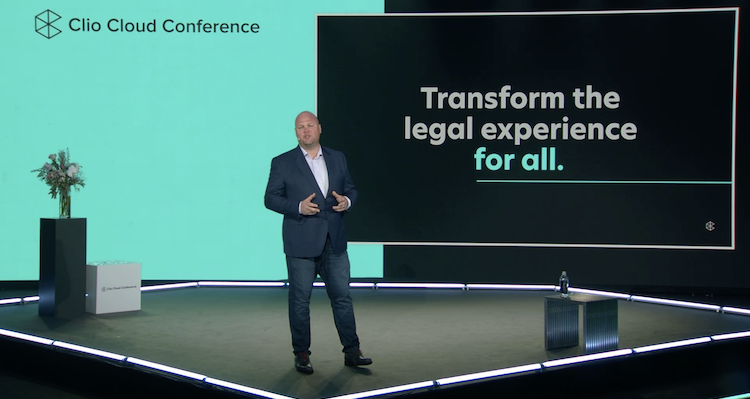Consumers increasingly desire remote legal services, Clio CEO says

Clio CEO Jack Newton speaks during his keynote address Tuesday at the Clio Cloud Conference.
When cloud-based company Clio surveyed American consumers in 2018, 23% expressed an openness to working with a lawyer remotely.
Fast-forward three years, and 79% of Clio survey respondents from the United States said the option to work with a lawyer in a remote fashion would have a positive influence on their decision to hire that attorney, according to the company’s 2021 Legal Trends Report.
Clio CEO and co-founder Jack Newton unveiled these statistics during his keynote address Tuesday at the ninth annual Clio Cloud Conference to emphasize the “seismic” impact that the COVID-19 pandemic has had on consumers’ appetites for remote legal services.
“This, more than anything else, is an indication that the changes we’ve seen in the past year will be here to stay, and that we are in fact in the midst of a punctuated change that will shape the future of legal services forever,” Newton said in his speech kicking off the event.
“The idea of a bricks-and-mortar law office being the primary place that lawyer-client interactions happen is gone—and gone for good,” he added.
While addressing attendees via video during the online conference, Newton shared that the growing consumer comfort with receiving legal services via videoconferencing was a prime example of how consumer expectations have changed amid the COVID-19 crisis.
When surveyed in 2018, no more than 4% of consumers preferred to communicate through videoconferencing at any stage within a legal matter.
But this year, more than 50% of respondents expressed a strong preference for videoconferencing across multiple stages of a legal matter, according to the Legal Trends Report.
For example, 58% of consumers said videoconferencing was a preferred option for a first meeting or consultation with a lawyer, and 61% expressed a preference for video communication during key milestones when a legal matter is underway.
“In just three years, we’ve gone from a tiny fraction of consumers being open to video calls to video becoming a critical aspect of how most clients want to communicate,” Newton said.
He also shared that consumer demand for remote communication with lawyers via client portals, text messaging and mobile apps has grown, as well.
This shift has come even as consumers still list in-person and phone meetings as top preferences for most lawyer communications.
Newton said law firms that want to position themselves for long-term success have to offer in-person and remote services, as 67% of Clio survey respondents said they would look for a lawyer who provides both.
The consumer data comes from surveys conducted of 1,002 American consumers in May and June of this year.
Consumers listed online payments as their strongest preference for how they would like to pay lawyers or law firms. With that information in mind, Clio announced that it has launched its own online payments platform, Clio Payments. The company said the system fully integrated into Clio will permit firms to remain fully compliant with legal industry rules for trust accounting.
According to the Legal Trends Report, growing law firms are 37% more likely than other firms to use online payments. Meanwhile, 67% of legal professionals reported that they see practice management software as a moderate or large expense, and 61% of legal those surveyed said they would invest more in software and hardware solutions.
During his keynote address, Newton highlighted several other ways that Clio has expanded its offerings to lawyers through partnerships with legal technology companies.
Clio announced that its recent acquisition of Lawyaw, a legal document automation solution, has already borne fruit. Lawyaw recently added automated court forms for New York, Florida, Texas, Illinois and Georgia, in addition to the forms that it previously offered at the state and federal levels in California.
Furthermore, Newton announced the launch of Clio Ventures, which will make direct equity investments in early-stage companies in the legal technology space with diverse leaders.
“We believe that for legal tech to continue to innovate, we need a diverse set of voices and thoughts around the table,” he said.
The Clio Cloud Conference, featuring an upward of 4,600 attendees from more than 40 countries, wraps up Friday.



